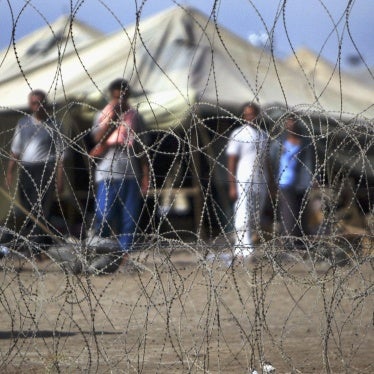It’s been a year since the Senate Intelligence Committee, in a summary of a still classified 6,700-word report, revealed new information about the brutality and depravity of the CIA’s so-called “enhanced interrogation techniques”: “rectal feedings” amounting to sexual assault, painful stress positions for days, diapers for discomfort and humiliation, striking and slapping detainees, and forcing some to stand for days to deprive them of sleep on broken bones in their legs or feet.
These facts amount to credible allegations of crimes, but the Justice Department hasn’t opened any new investigations. The Justice Department claims its only investigation to date—led by U.S. Attorney John Durham—was “extraordinarily thorough.”
But Durham prosecutors looked into 101 cases of detainee abuse and brought no charges, closing 99 of the 101 cases in 2011 and the remaining two in 2012. The Durham investigation was always too narrow because it was primarily aimed at CIA actions that went beyond the so-called legal “authorizations” provided by the Justice Department’s Office of Legal Counsel (OLC) —even though these authorizations have since been largely discredited.
But even within this narrow scope, an enormous amount of information has been disclosed now that would seem to fit even within the bounds of that investigation.
The Senate Intelligence Committee summary extensively documents these types of abuses. In addition to the “rectal feedings,” there were “rough take downs” –when CIA personnel stormed a detainee’s cell, cut off his clothes, struck him, and dragged him down a hall, naked; and “water dousing,” which often involved forcing detainees into ice cold water, and pouring water over their face until they couldn’t breathe. Presumably the full still classified report contains even more information but the Justice Department has given conflicting accounts about whether it has even read the full report.
We interviewed many former detainees that the CIA abused and tortured in ways that were not authorized, and in ways that exceeded authorizations. But no Justice Department investigators ever interviewed them. Other former CIA detainees have said investigators never spoke to them either. The Justice Department has flatly refused to answer questions about whether it spoke to any former detainees at all, so it’s puzzling how they could be sure they thoroughly looked into alleged conduct that went beyond what was claimed to be “legally authorized.”
Even John Yoo, author of the original authorizations for “enhanced interrogation techniques,” concedes that many of the abuses described in the Senate summary exceeded authorizations and expose those who carried out the conduct to criminal liability.
We also don’t know whether Durham’s investigators had access to other essential witnesses and evidence. Durham has not said much publicly about the investigation. But in a recently filed declaration in a Freedom of Information Act request brought by the New York Times, he admitted that during his examination of 99 of the 101 cases, there were “limitations on the evidence available to [his] team.” If this is the case, it is hard to understand how the investigation could have been thorough.
Under the Convention against Torture, a treaty ratified by the U.S. and more than 150 other countries, the U.S. has an international legal obligation to credibly investigate and prosecute torture. It has not done so. The U.S. also has an obligation to provide redress and compensation to victims of torture, but it hasn’t and has actively thwarted attempts by former CIA detainees to pursue both in U.S. courts, frequently by asserting what is known as the “state secrets privilege” – a privilege that allows courts to give government claims that litigating cases would harm national security great deference and is very difficult to challenge.
The U.S. should change its position for any new civil cases that come forward given that so much information about the CIA program is in the public domain. Claims of harm to national security should be given serious scrutiny and not blindly accepted, especially given that the dire warnings that release of Senate Intelligence Committee summary would cause “violence and deaths” abroad came to nothing.
Any new investigation should be led by a special prosecutor since the Justice Department is heavily implicated in authorizing the CIA program. It should include examination of those responsible for approving use of “enhanced interrogation techniques” to begin with as well as those responsible for carrying out conduct beyond what was authorized.
In short, there are a variety of ways the U.S. can provide some accountability for these serious crimes, but so far it has done nothing. The starting point should be opening a thorough and credible investigation. Otherwise the U.S. will be hard pressed to make any attempt to urge other countries to prevent and punish torture, and to respect the rule of law more generally. And by ignoring its legal obligations, the U.S. gives other countries a ready excuse to do the same.
At a time when ordinary people around the world face ever greater risks of violence, the U.S. has an opportunity to demonstrate its commitment to fundamental rights and the rule of law, even when it means holding its own to account.








